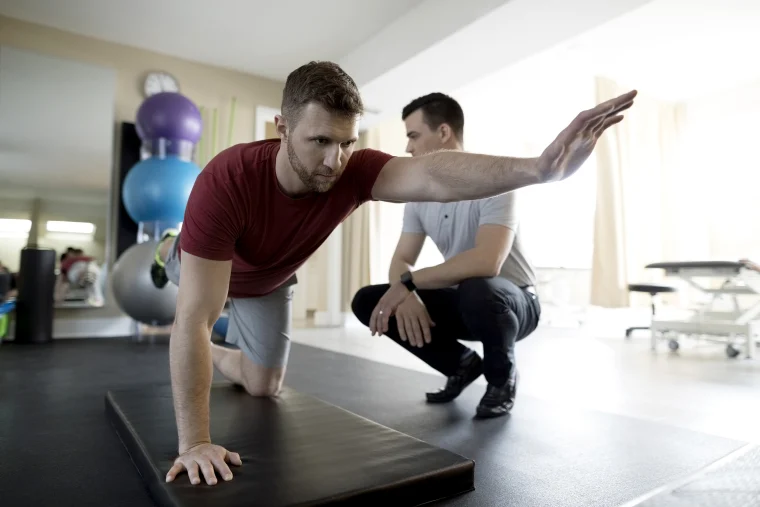
ISLAMABAD, Aug 19(ABC): New researchTrusted Source from Edith Cowan University (ECU) in Australia indicates a small amount of daily activity is more beneficial than less frequent, more intense workouts when it comes to muscle strength.
ECU collaborated with Niigata University and Nishi Kyushu University in Japan on a four-week training study featuring three groups of people doing an arm resistance exercise with researchers measuring changes in muscle strength and muscle thickness.
The exercise consisted of “maximal voluntary eccentric bicep contractions” performed on a machine measuring muscle strength in each muscle contraction one would do at the gym.
Two groups did 30 contractions per week. One group performed six contractions a day for five days a week while the other jammed all 30 into a single day, once a week. Another group only performed six contractions one day a week.
After four weeks, the group doing 30 contractions in a single day didn’t show any increase in muscle strength, although muscle thickness increased by almost 6%.
The group doing six contractions once a week showed no changes in strength or size.
However, the 6×5 group showed significant increases in strength – more than 10 percent – with an increase in muscle thickness similar to the 30×1 group.
The results were similar to people in a previous study performing only one 3-second maximal eccentric contraction per day for five days a week for four weeks.
“People think they have to do a lengthy session of resistance training in the gym, but that’s not the case,” said Ken Nosaka, ECU exercise and sports science professor, in a statement. “Just lowering a heavy dumbbell slowly once or six times a day is enough.”
Although researchers only examined bicep curls in the study, “we believe this would be the case for other muscles also, at least to some extent,” Nosaka said.
What other experts think
Dr. Katie Hill, the chief medical officer of healthcare provider Nudj Health, told Healthline it’s “much better” to have moderate exercise as many days a week as possible rather than one or two mega-sessions per week.
“There is more and more evidence proving that moving regularly throughout each day needs to be combined with about 150 minutes (per week) of moderate intensity exercise to best reduce the risk of death, heart disease, obesity, and other chronic illnesses,” Hill said. “In fact, people who routinely live to over 100 years old, like those from Loma Linda, California, Sardinia, Italy, and Okinawa, Japan, have lives that naturally require movement about every 20 minutes.”
Hill added that regular movement is the best way to stay fit at any age.
“No one is too old to benefit from moving more,” she said. “Every exercise schedule should include a mix of strength training, balance training, and aerobic activities. Strength and balance training maintains bone health, reduces fall risk over time, and is linked to improved insulin sensitivity and other metabolic laboratory values, among other benefits. Aerobic activity improves cardiovascular fitness and directly contributes to lengthening telomeres, which is closely linked to longevity.”
Dr. Rafael S. Garcia-Cortes, a cardiologist and heart failure and transplant specialist with Ascension Medical Group at St. Vincent Hospital in Indianapolis, told Healthline that people should remember that “anything that you do is better than nothing.”
“Walking one mile at a low speed is better than sitting at home,” Garci-Cortes said. “In fact, the (Physical Activities Guidelines for Americans) emphasizeTrusted Source that moving more and sitting less will benefit nearly everyone. Therefore, you should try to always hit at least 10 minutes per session and to continue progressing. In the beginning, it’s OK to be humble and continue working toward improvement rather than risking an injury.”
“Having said that, you should at least try to follow 3 to 5 days of physical activity and, if you manage to continue improving, you will undoubtedly meet the goals for physical activity, you will see all the long-term benefits on your overall health,” he added.
Why consistency matters
The type of activity can vary, but what’s important is that it’s regular, says Dr. Nick West, a cardiologist and chief medical officer of Abbott’s vascular business.
“Recent evidence from different sources suggests that relatively short but regular bursts of weight training, even at low intensity, can not only provide the same strength/muscle-building effects as infrequent more strenuous workouts but also that short walks, especially after meals, can lower blood sugar surges and reduce the risk of developing type 2 diabetes,” West told Healthline.
“These data clearly emphasize that frequent but lighter exercise can provide important health benefits,” he added.
Regular, less-intense workouts also minimize the risk of injury, said Dr. Rene Armenta, a bariatric and general surgeon for Renew Bariatrics.
“When you work out intensely, you put your body under a lot of stress, which can lead to injuries if you’re not careful or if you’re not used to that level of intensity,” Armenta told Healthline. “By spreading out your exercise routine, you give your body time to recover between sessions and reduce your overall risk of injury.
“This is convenient for those who can’t commit to mega-sessions a week but can realistically commit to moderate exercise most days,” he added. “Small exercise is still exercise and will always be better than no exercise at all. Even just five minutes of activity can already make a big difference. Even if they’re small and short, they can still have a big impact on your overall health and well-being, especially when all your efforts are put together.”
“Daily moderate exercise can also be beneficial for those who find themselves in a love-hate relationship with exercise,” Armenta noted. “If you often find yourself skipping workouts because you dread them, then moderate exercise might be a better solution for you. This way, you won’t have to force yourself to work out as much, and you’re less likely to get burnt out and give up on your fitness goals altogether.
How to stay consistent
Hill said people who don’t already exercise should start simple in ways that fit into existing routines.
“Choose one or two exercise movements and pick a small minimum goal, a goal so easy it’s hard not to succeed even on a bad day,” Hill said. “Pick an activity during your day that you already do automatically and commit to doing that minimum exercise right after that activity.”
“Write the goal down somewhere visible. For example, ‘Every time I use the restroom today, I will do at least two squats.’ Evidence suggests that most people will naturally do a little more than their minimum once they get moving, so a typical person might actually accomplish 3 to 5 squats three or four times a day,” she explained.
“After accomplishing the minimum goal, celebrate in a simple way, such as a fist pump combined with a “YESSSS!” Research suggests that the people who are most successful at maintaining an exercise habit over time are those who derive some immediate benefit instead of those who only focus on a long-term goal like weight loss. The celebration at the end of the exercise activity is an important way of getting that immediate reinforcement,” Hill noted.
“Over time, increase your reps, add weight, or add another exercise. Eventually, reserve time in your schedule for your new physical activity habit and it will become an essential part of your self-care routine,” she said.


























